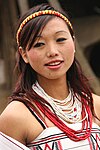 "Koireng" written in Meitei script | |
| Total population | |
|---|---|
| 2600 (2011 census) | |
| Regions with significant populations | |
| Languages | |
| Koireng language (L1) Meitei language (L2)[1] | |
| Religion | |
| Christianity | |
| Related ethnic groups | |
| Meitei people, Aimol, Kom, Ranglong |
The Koireng people are one of the ethnic groups inhabiting Manipur in North-East India. They speak the [Koireng language]. They are mentioned in the Meitei royal chronicle Cheitharol Kumbaba in the year 1404, one of the oldest tribes to be so mentioned.[2] They have a shared common ancestry, history, cultural traits, folklore and dialects with their kindred people like Aimol and Kom.[citation needed] They use Meitei language as their second language (L2) according to the Ethnologue.[3]
